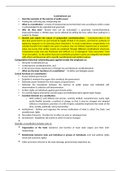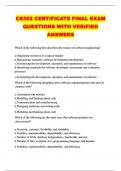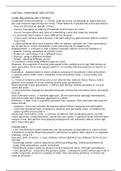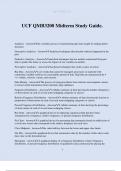• Describe examples of the exercise of public power
• Making law, enforcing law, interpreting law
• What is a Constitution? -A body of fundamental and entrenched rules according to which a state
is acknowledged to be organized and governed.
• Why do they exist? -Known laws can be evaluated 1. good/bad, harmful/beneficial,
improved/revoked; 2. Written laws can be affected by editing the text, rather than waiting for a
custom to change.
• Identify and explain the nature of comparative constitutionalism. - Constitutionalism is the
idea that government can and should be legally limited in its powers, and that its authority or
legitimacy depends on its observing these limitations. To study constitutions comparatively is to
consider/benefit from insights into parts of systems that are (falsely) experienced as essential –
when one learns that similar results are produced through different constitutional structures.
Comparative study may also illuminate how difficult it is to distinguish "false necessities" from
"true necessities," to the extent that each constitutional system's parts are integrally interrelated
with others and bound up with a specific constitutional and political culture.
Comparative historical scholarship goes against trends the emphasis on
• Domestic Constitutional Law
• Contemporary constitutionalism, and
• In the process shows importance of foreign law and historical constitutionalism
• What are the basic functions of a constitution? - To define and delegate power.
Central functions of a constitution:
• Ensure limited government
• Establish & maintain the organs that constitute the government
• Delineate power between the main organs of government
• Delineate the boundaries between the exercise of public power and individual self-
determination & collective self-determination.
• Confers rights on individuals against government action
• To a certain degree entrenches central organs and individual rights against legal change.
• Essential elements of a constitution:
o Well written well defined and precise, carefully drafted; comprehensive; partly rigid,
partly flexible (provide a method of change so that it may be changed and adopted
without a revolution); provision of a bill of rights; suitability (represent the needs of the
time, socially, politically, and economically).
♦ Institutional – Defines and organizes the various institutions of what is called ‘the State’ and
possibly basic rights
♦ Normative Hierarchy - Provides for its effect on prior or subsequent law
♦ Amendment - Establishes the extent to which it may be changed
♦
Typically, a Constitution includes rules on
• Organization of the State (existence and function of basic state organs and their inter-
relationship).
• Relationship between state and individual or groups of individuals (civil and political rights,
social and economic rights).
• Other provisions relevant to the state ideology, governmental objectives etc.
,*What are the main aims of a constitutional order?
Define the role of government, the different parts of government, define the powers of government, set
limitations on those powers, and to provide a means of change for the Constitution, protection of
fundamental rights against the abuse of government.
• Two main understandings of a Constitution.
1. Formal – Narrow:
does not describe the whole collection of norms, legal and non-legal, but rather a
selection of them which has usually been embodied in one document or in a few closely
related documents. Law making is rigid and must follow a process to change, making it
time consuming. However, is concise at all times.
Almost exclusively legal documents
Narrow Definition: Constitution as a text
2. Functional – Broad
Describes the whole collection of rules which establish and regulate or govern a country
or polity. 1)Partly legal norms, in the sense that courts of law will recognize and apply
them and, 2) partly non-legal or extra-legal norms; taking the form of usages,
understandings, customs, conventions, interpretative context or practices which courts
do not necessarily recognize as law, but are no less effective in regulating societal
interactions than the formal rules or laws strictly. Law making is “fluid”, and adjusts with
progress. However, legalities can be unclear.
Constitution not only as a text, rather beyond a single formal document.
What is Young’s main contention?
Young contends that a broader functional understanding of the constitution, rather than a formal
understanding, better reflects constitutional reality.
Young argues we must understand and incorporate the ‘constitution outside the constitution’.
Who has the ultimate authority to exercise constitutional power? – Whoever is stated to have it in the
constitution. The Constitution is the law of the land, and so it is superior law. Generally, power is divided
between legislative, executive, and judicial branches.
Nature & Organization of the State
Existence and Regulation of important State Institutions through the division of power.
*On the State level itself:
• Existence: they must exist separately from one another (important criterion: distribute the
‘powers’/’branches’)
• Regulation: they must operate separately or together with one another (important criterion:
separate and detail the ‘functions’)
*On the State v. Local level:
• Division of power between Federal Government v. Federated State/Devolved Local Authority
Constitutions may provide for the relationship between state and individuals or groups of
individuals
• Constitutions may provide for norms related to the local context
Who has the right to establish and modify the constitutional rules? -Legislative conditional to judicial
through the application of judicial review.
Value of enforceable provisions:
o Mutual promises constitute consideration for each other (“quid pro quo”)
, Who applies them? Judicial Review
Supreme Court
Constitutional Court
Diffused Review of Constitutionality (many court)
What effect do they have?
Constitutional Amendment: New constitutional provisions operate for the future (prospective)
Revolutionary Constitution: Constitutional provisions operate for the past as well as for the
future (retroactively and prospectively)
Changing a Constitution: Amendment
The Constitution may provide for constitutional change
Is it difficult or easy to amend?
Theory v. Practice
Constitution makers: Do we want a constitution that is
Difficult: Rigid
fundamental and unchanging law (i.e. rigid) or
Easy: Flexible
one that is work in progress and open to debate (i.e. flexible)?
Some provisions may be unalterable, some may require higher majority, some follow general rules.
Interpreting Understanding constitutional law:
combining backward-looking (the text, if it exists) with forward-looking assessment (practice;
constitutionalism), i.e. applying existing law to future cases.
Young argues we must understand and incorporate the ‘constitution outside the constitution’.
Who has the right to exercise public power, authority, and influence within a constitutional
system? Public power means the power vested in a person as an agent or instrument of the state in
performing the legislative, judicial, and executive functions of the state, i.e. administrative law. It also
refers to the not-for-profit utilities that are owned and operated by a municipality, state, or the federal
government.
The Exercise of Public Power
According to the Constitutional Court, administrative law is "an incident of the separation of powers
under which the courts regulate and control the exercise of public power by the other branches of
government."
Exploring the evolution of the history of comparative constitutionalism via law and an
interdisciplinary approach
Illustrate that law and politics are interrelated, but also separate and distinct concepts.
Legal force – expressed in different ways,
Early constitutional documents that provided the nobility with ability to contest the monarch’s
power if the latter did not adhere to limitations placed on it
To independent judicial review
*Central themes of Constitutionalism (Federalist papers- essay 10):
Who ought to govern? An essential question in the history of constitutional thought.
“the Few over the many”
, A central theme throughout the history of constitutional law and governance is the
dominance of a particular actor-group(s) i.e. factions, over others.
Factions: “A number of citizens, whether amounting to a majority or minority of the
whole, who are united and actuated by some common impulse of passion, or of interest, adverse to the
rights of other citizens, or to permanent and aggregate interests of the community”.
Explain the importance of faction
Each branch has its own distinct institutional perspective based on their members own
interests, constituencies, training, appointment or electoral process.
Madison contends that it is not possible to remove the causes of faction, but it may be
possible to control its effects
A minority faction can be controlled by popular vote, it will lose to the majority.
A majority faction, on the other hand, through popular government can infringe on both
the public good and the rights of other citizens.
What are factions?
Different (interest) groups of people within a society with similar social ideas, identity, goals,
norms, values, etc. which separate them from others→ seeking to have their interests represented in
government over the rights of others. (=political interest).
Factions can also exist within diff. governmental branches (political parties).
Minority faction→ group that has little political power/authority; have limited influence on public
debate, and limited ability to shape government. Minority in this case does not refer to the number
of individuals.
How do we reconcile the needs of diff. factions?
Regardless of system, everyone should be checked. System can utilize affirmative action. (Reserve
seats in gov. to ensure representation and participation).
Importance of factions: each faction has their own perspective on issues of debate, thus is
necessary to be heard in order to create most inclusive policy.
Normative- how things ought to be (ideally) in reality
Descriptive- describing from observation of reality
Normative is central in history of Constitutional thought→ who ought to govern
Dominance of a group is pervasive in constitutional history
Balance, essential to constitutional thought→ relationship of those exercising power and
those seeking self- determination. To guarantee state function some governmental interference is
necessary.
Separation of powers: Relationship of those exercising power on the same level → executive,
legislative, judicial.
Relationship of those exercising power on multiple levels → federalism (city, county,
regional, state, federal).
Checks and balances can work on any level.
Electorates are supposed to represent democracy. However, they can operate within
themselves, and go against the will of the people.












